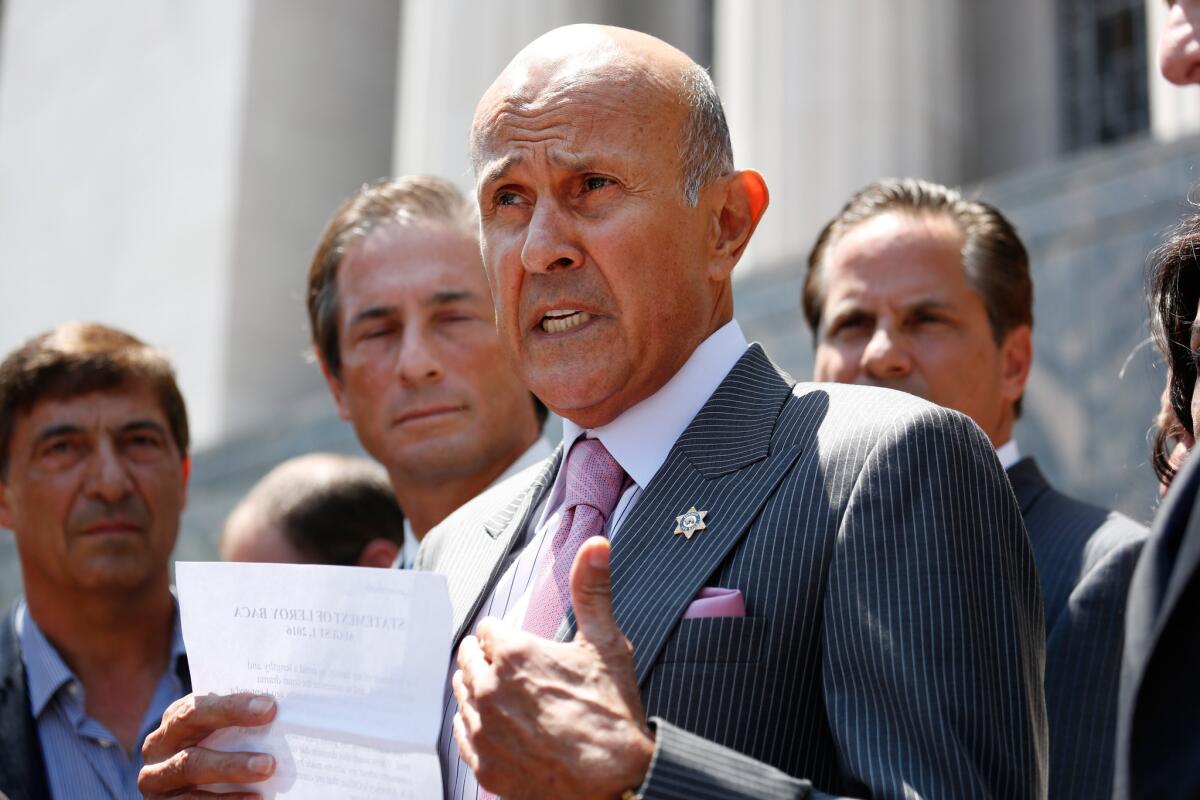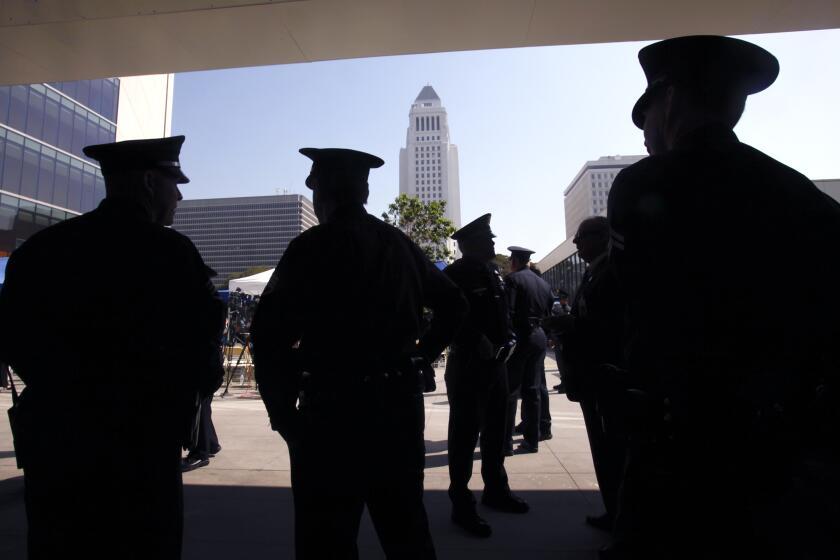New federal charges accuse ex-Sheriff Lee Baca of obstructing justice, lying to authorities

Days after withdrawing a guilty plea for lying during an FBI investigation into widespread abuses at the county jails, former Los Angeles County Sheriff Lee Baca was indicted Friday on more serious charges that could bring up to 20 years in prison.
The former sheriff, who is in the early stages of Alzheimer’s disease, faces new charges of conspiracy, obstruction of justice and making false statements.
Friday’s indictment was the latest in an extraordinary series of events that began last month when a federal judge rejected a plea agreement limiting Baca’s prison time to six months on the single false statement charge.
U.S. District Judge Percy Anderson said that was too lenient for the man who led the Sheriff’s Department during a period when deputies covered up for one another and violently attacked inmates.
On Monday, Baca failed to reach a new settlement with prosecutors and withdrew his guilty plea rather than let Anderson sentence him to up to five years, setting the stage for the new charges and a high-stakes trial.
In Friday’s indictment, prosecutors accuse Baca of “creating an environment” in which his subordinates viewed the FBI as an adversary and of tasking his second-in-command, Paul Tanaka, with carrying out the scheme to obstruct the federal investigation into brutality and corruption by jail deputies.
Michael Zweiback, one of Baca’s attorneys, called the indictment “weak” and said prosecutors were punishing his client for going to trial.
“The fact that he was present and the head of the organization is really what the main focus is on,” Zweiback said of the indictment. “It’s clear that other people executed the plan.”
Anderson had previously sentenced Tanaka, the former undersheriff, to five years behind bars and seven other lower-ranking sheriff’s officials to terms ranging from a year and a half to more than three years for their roles in obstructing the federal investigation.
The indictment alleges that Baca, 74, conspired with Tanaka and others to keep federal investigators away from a jail inmate, Anthony Brown, who was providing information about deputies who were allegedly abusing inmates.
After sheriff’s officials caught Brown with a cellphone smuggled to him by the FBI and a jail deputy, Baca ordered his subordinates to keep Brown isolated and to interview him, according to the indictment.
By Aug. 26, 2011, prosecutors allege, Baca had approved overtime for deputies to guard Brown and prevent federal investigators from talking to him.
In a meeting and a subsequent letter, Baca told officials from the U.S. attorney’s office that he was displeased about the federal investigation, the indictment alleges. He asked them to withdraw the grand jury subpoenas they had served on the Sheriff’s Department, said that sheriff’s officials would investigate the FBI for violations of state law, and threatened to pull out of joint task forces.
Baca also met with Tanaka and other subordinates on Sept. 22, 2011, about approaching an FBI agent at her home, the indictment alleges. Four days later, two sheriff’s officials confronted the agent outside her home and threatened her with arrest.
The false statement from Baca’s plea agreement, which involved his assertion in an April 2013 interview with federal prosecutors that he did not know about the plan to go to the FBI agent’s house, is included in Friday’s indictment, along with four other alleged false statements.
On Thursday, a federal appeals court upheld the convictions of the seven lower-ranking deputies in the obstruction case, clearing the way for them to begin serving their prison sentences and dealing a significant blow to Tanaka, who has vowed to appeal his conviction on grounds similar to those raised by the deputies.
Laurie Levenson, a Loyola Law School professor and former federal prosecutor, said the case against Baca could settle before trial, noting that the progression of Baca’s illness is a wild card that could affect his ability to understand the proceedings.
She predicted that Baca would end up with five years or less in prison, since the indictment does not allege he was the main driver of the conspiracy.
“Looking at the overall conspiracy as alleged by the prosecution, even though Baca is involved, he still doesn’t seem to have the most nefarious role,” she said.
Miriam Krinsky, another former federal prosecutor who led a blue-ribbon commission on jail violence, said it is often harder for the government to prove its case against higher-ranking officials than the lower-ranking ones who carried out their orders.
But, she said, “it’s important for the government in a case such as this to not end its investigation and pursue justice at the lower levels of authority but to go to the highest rung of the ladder.”
George Hofstetter, president of the union that represents sheriff’s deputies, released a statement saying that Baca deserves no less than the five-year sentence Tanaka received.
“Baca knew what was going on, and he perpetuated and encouraged the culture,” Hofstetter said. “When confronted with the mess he had created, Baca blamed his subordinates instead of taking responsibility as a leader should.”

Former L.A. County Sheriff Lee Baca admitted lying to federal prosecutors who questioned him about whether he was involved in attempts to obstruct an FBI investigation into the county jails. In this audio, assembled from a nearly four-hour recording
ALSO
Woman found dead in car outside a La Habra movie theater
Lunada Bay Boys surfer gang hit with another class action lawsuit
City to pay $50,000 to ex-LAPD detective who sued after being fired for racially charged remarks
UPDATES:
UPDATE:
8:30 p.m. This story was updated with more details of the indictment and quotes.
More to Read
Sign up for Essential California
The most important California stories and recommendations in your inbox every morning.
You may occasionally receive promotional content from the Los Angeles Times.











